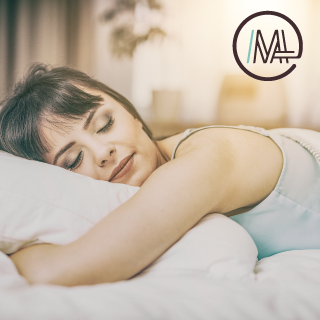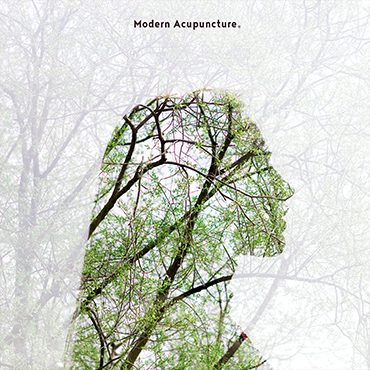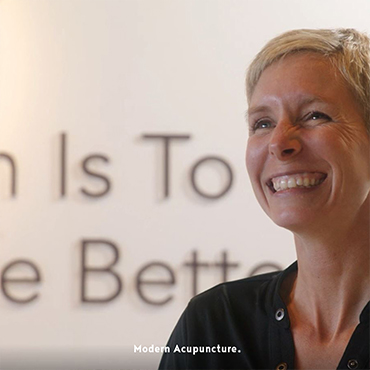Put Sleep Disorders to Bed with Acupuncture

Sleep can be one of life’s greatest pleasures or one of its biggest frustrations. According to the American Sleep Association, most healthy adults need 7-9 hours of sleep nightly to function their best.
In 2017, SleepScore Labs released the largest consumer sleep study in history proving that few people actually get the minimum amount of rest they need in order to stay healthy. Fortunately, there are many all-natural remedies to help you sleep better at night with one of those remedies being acupuncture.
How Acupuncture Promotes Better Quality Sleep
In 2014, the CDC (Center for Disease Control) declared sleep deprivation to be a public health epidemic.
Think that sounds a bit extreme? Not when you consider the true impact of sleep deprivation. Chronic sleep loss takes a big toll on your body - both inside and out. We see the short terms signs of sleep deprivation manifested every morning in the mirror after a restless or sleepless night. Dull complexion. Dry skin. Bags and dark circles under our eyes.
In 2013, a university study commissioned by Estee Lauder was the first to definitively link poor sleep with increased signs of skin aging and slower recovery from a variety of environmental stressors, such as disruption of the skin barrier or ultraviolet (UV) radiation.
We feel it, too. Low energy. Fatigue. Stress and anxiety. Worrying. Will I be able to sleep tonight? Will I have to resort to over the counter meds, or prescription sleep medications?
While sleep medications may be helpful in dealing with insomnia and other sleep disorders in the short term, they are not generally recommended for long-term use. Sleep medications can be physically and psychologically addictive and come with some serious potential side effects and health risks.
In fact, researchers found that people taking certain prescribed and over-the-counter sleep medications were almost five times more likely to die over the 2.5-year study, compared with those who didn't take sleep medication.
That’s a pretty substantial risk. It’s no wonder so many people are dumping their pills and turning to alternative therapies in their quest for a good night’s sleep.
When we look at the research centered on acupuncture, it tells a pretty positive story. In February 2018, a clinical trial study released by researchers at the prestigious Zhejiang Chinese Medical University found acupuncture to be more effective than certain drugs types similar to those routinely prescribed for the treatment of insomnia.
While the sample sizes were relatively small for these controlled clinical trials, both strongly indicate acupuncture as is an effective treatment method. The average age of the clinical subjects was around 50 - 53 years of age. Patients in the treatment group underwent a combination of conventional body style acupuncture and auriculotherapy to activate important points in the ear area.
A separate study conducted by Yuexiu District Second Hospital of Traditional Chinese Medicine researchers also found acupuncture more effective than benzodiazepine type medications. That’s great news!
So How Does Acupuncture Work?
Not only does acupuncture help with better sleep but also can address those symptoms that are keeping you up at night and get to the root of why those symptoms are occurring in the first place. Traditional acupuncture utilizes tiny needles to access distinct points on the body to restore balance, alleviate pain, stress and anxiety, enhance sleep, and improve overall well-being. When systemic balance is restored, symptoms disappear and greater overall health is achieved. After one session, regardless of what you are being treated for, many notice better sleep that same night, reduced stress, and a feeling of calm and well-being.
Cosmetic acupuncture has similar health benefits of traditional treatments, but is also considered an ancient beauty secret. The whole-body approach to wellness addresses the surface signs of aging as well as the internal stressors that contribute to the aging process and the side effects associated with insomnia including under-eye bags, wrinkles, skin hydration, and complexion.
Looking better, feeling better or getting a great night’s sleep - no matter what your goal for acupuncture treatment - following a treatment plan provided by a licensed acupuncturist will help you achieve optimal results.
Insights from 1.5 Million Nights of Sleep:
-
79% of people get less than the recommended seven hours of sleep
-
Women sleep longer – men average 5 hours, 45 minutes, while women average 6 hours, 9 minutes
-
50% reported regularly using a mix of two or more sleep aids per night, such as prescription medications, over-the-counter sleeping pills, or herbal remedies/food supplements for sleep
Risk Factors For Insomnia
Anyone can and will have an occasional sleepless night, but on average 30 percent of adults report having short terms bouts of insomnia. Most people will toss and turn for a night or two and get back on track after a few days. Others aren’t so lucky. Ten percent of adults suffer from chronic insomnia lasting months or even years. For those who suffer from chronic insomnia, the issue is threatening to their overall health and wellbeing. Your risk for insomnia is greater if:
-
You’re a woman - any age
-
You’re over the age of 60
-
You have a mental or physical health condition
-
You’re under a lot of stress daily
-
You don’t have a regular schedule
Symptoms of Insomnia
The American Sleep Association estimates that 50-70 million US adults have some form of sleep disorder. The most common sleep disorder is insomnia, which is characterized by trouble falling asleep and staying asleep. Insomnia symptoms may include:
-
Difficulty falling asleep at night
-
Waking frequently during the night
-
Waking too early and can’t fall back asleep
-
Feeling tired even after a night's sleep
-
Daytime tiredness, drowsiness or sleepiness
-
Irritability, depression or anxiety
-
Difficulty focusing on tasks or memory loss
-
Increased mistakes and risk for accidents
-
Ongoing worries about sleep
What’s Keeping Us Up at Night?
The unrelenting 24/7 pace and stressors of today’s world means sleep is even more important to our general health and wellbeing than ever before. Lack of sleep can impair judgment, coordination, and reaction times just as much as being intoxicated, raising the risk for accidents in the home, workplace and on the road. Here are the most common culprits:
Stress. Concerns about work, school, health, money or family can keep your mind racing and make it hard to fall asleep. Traumatic, high-stress life events such as the death or illness of a loved one, divorce, or a job loss can also lead to insomnia.
Caffeine, nicotine and alcohol. Coffee, tea, cola and other caffeinated drinks are stimulants. Avoid drinking them in the late afternoon or evening. Nicotine is another stimulant that can interfere with sleep. Alcohol can help you fall asleep, but prevents you from reaching the high quality deeper stages of sleep, plus it may keep you waking up in the middle of the night.
Disruptive travel or work schedule. Your body’s circadian rhythms act as an internal clock for your sleep-wake cycle, metabolism and body temperature. Jet lag, working late, early or frequently changing shifts can lead to insomnia.
Poor sleep habits. Computers, TVs, video games, smartphones and other electronic screens before bed can disrupt your sleep cycle. Naps, stimulating activities before bed, an uncomfortable sleep environment, and using your bed for work, eating or watching TV are also indicative of poor sleep habits.
Mental health disorders. Anxiety disorders like PTSD (post-traumatic stress disorder) may disrupt sleep. Insomnia is also closely associated with depression and other mental health disorders.
Medications. Some prescription drugs like certain antidepressants, asthma or blood pressure medications can disrupt sleep. Over-the-counter pain, allergy and cold medications, and weight-loss products often contain caffeine and other stimulants that can disrupt sleep.
Medical conditions. Some of the conditions linked with insomnia include chronic pain, cancer, diabetes, heart disease, asthma, gastroesophageal reflux disease (GERD), hyperthyroidism, (overactive thyroid), Parkinson's disease and Alzheimer's disease.
Sleep-related disorders. Sleep apnea is a serious disorder that causes you to stop breathing periodically throughout the night, interrupting your sleep. Restless leg syndrome is characterized by unpleasant sensations in the legs coupled with an almost irresistible desire to move them, which may prevent you falling asleep or staying asleep.
What long term sleep deprivation does to our bodies is of even more concern. Multiple studies and reports reveal untreated sleep disorders can result in:
-
Lower performance on the job or at school
-
Slowed reaction time while driving and a higher risk of accidents
-
Mental health disorders such as depression, anxiety or substance abuse
-
Increased risk for developing diseases or health conditions like high blood pressure, heart disease, diabetes, and obesity
-
Rapid aging and breakdown of collagen resulting in fine lines, uneven pigmentation and reduced skin elasticity
If you have trouble sleeping or regularly struggle with insomnia or any other type of sleep disorder, you owe it to yourself to try an acupuncture treatment plan. When combined with other calming sleep hygiene practices like meditation and herbal teas, acupuncture treatments can make your nightlife a dream and you’ll look and feel well-rested. Best of all - better sleep is a common side effect associated with any type of acupuncture treatment, so there’s no ‘snooze, you lose’ factor in play.
Find a location near you to book an appointment today and sleep better tonight.
[Back to main news page]



